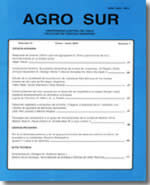Host-specificity Study of the gorse moth Agonopterix ulicetella (Stainton) for the biological control of gorse Ulex europaeus L.
Main Article Content
Abstract
Host-specificity studies of the moth Agonopterix ulicetella (Stainton) a potential bioagent for gorse Ulex europaeus were conducted under quarantine conditions in Chile. In experiments to assess survival, feeding and oviposition, the natural host U. europaeus and 11 closely related critical plant species from the family Fabaceae were exposed to the insect. Choice and non-choice test were performed under total confinement (caged leaves) and partial confinement (potted plants). Gorse was highly preferred over the critical plant species. The level of confinement did not significantly affect the host range of A. ulicetella. Choice test under total confinement proved to be more practical to measure the insect host-specifícity in quarantine. In total confínement larval feeding and development occurred on gorse, L. albus, L. arboreus, and S. junceum in non-choice tests whereas in choice test under partial confinement the larva significantly (P< 0.05) preferred gorse. These results suggest that A. ulicetella, if released in Chile for the control of gorse should not pose a significant threat to non-target plants.

